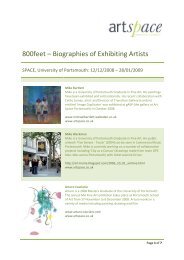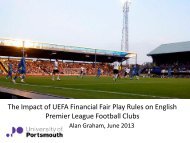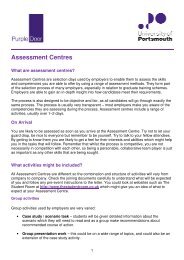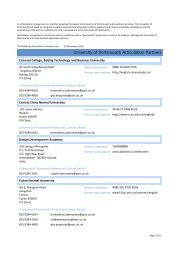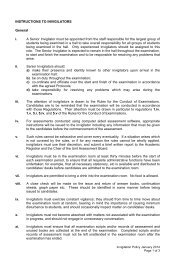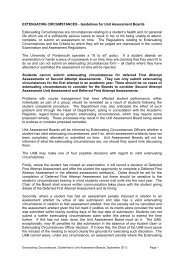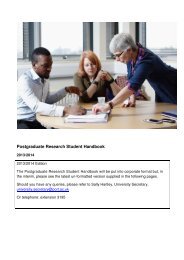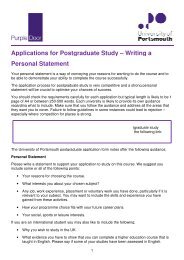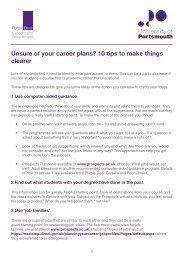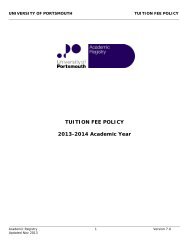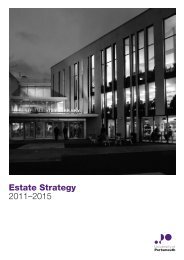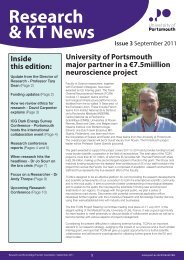RKT News February 2013 - University of Portsmouth
RKT News February 2013 - University of Portsmouth
RKT News February 2013 - University of Portsmouth
You also want an ePaper? Increase the reach of your titles
YUMPU automatically turns print PDFs into web optimized ePapers that Google loves.
Focus on a researcher<br />
Brad Beaven<br />
Principal Lecturer in the School <strong>of</strong> Social,<br />
Historical and Literary Studies (SSHLS)<br />
Current project titles:<br />
I am a social and cultural historian who focuses on British<br />
society in the nineteenth and the early twentieth centuries. I lead<br />
one <strong>of</strong> the Faculty’s strategic research projects; ‘Port Towns and<br />
Urban Cultures’ exploring the social and cultural impact <strong>of</strong> ports<br />
on the urban hinterland from the eighteenth century to the<br />
modern period. We have developed this project in collaboration<br />
with the National Museum <strong>of</strong> the Royal Navy (NMRN). My own<br />
research focuses on the social and cultural context to<br />
‘sailortowns’ between 1800 to 1939 and I have begun<br />
examining over 200 sailor diaries <strong>of</strong> all ranks.<br />
Why did you become a researcher?<br />
History is not a static subject but one that is constantly reinterpreting<br />
and challenging orthodox viewpoints. You can go<br />
for days without finding relevant material and then stumble upon<br />
a fantastic set <strong>of</strong> archives that alters your whole perception <strong>of</strong><br />
an event. It is that piecing together <strong>of</strong> fragments from the past<br />
and shedding new light on a long-standing historical<br />
controversy that makes research an enjoyable experience.<br />
Describe a typical day at work:<br />
I am currently organising an international conference titled ‘Port<br />
Towns and Urban Cultures’ with our partners at the NMRN for<br />
July <strong>2013</strong>. I am also writing a paper for a social and cultural<br />
workshop on maritime history in Aland Islands, Finland. The<br />
diaries that I have been researching will hopefully provide a nice<br />
contrast as they reveal the sailor’s actual experience <strong>of</strong> sailor<br />
town life. With this project, the advantage is that there are a<br />
huge number <strong>of</strong> sailor diaries on my doorstep.<br />
Who has influenced you most in life and why?<br />
My parents brought me and my brother up in a very happy<br />
household in Coventry between the late 1960s and 1980s, a<br />
period which saw great changes in the city’s industrial<br />
landscape. My whole family – grandparents, Dad and brother<br />
worked in the declining car industry. My grandfather used to<br />
take me to play snooker at some <strong>of</strong> the large, elaborate social<br />
clubs complete with ball rooms, bars and snooker tables. These<br />
have long since been demolished but I think it inspired me to try<br />
to capture ‘club life’ in my research on working-class leisure.<br />
More recently it has been my wife Becky, and our sons George<br />
(eight) and Sam (two) who can always be relied upon to help me<br />
keep work in perspective.<br />
What are your interests outside <strong>of</strong> work?<br />
At every opportunity I will try to watch a Coventry City game.<br />
Despite their slow decline to the lower reaches <strong>of</strong> League 1 and<br />
being under the constant threat <strong>of</strong> liquidation, I still can’t help<br />
myself from becoming wildly optimistic after they win a couple<br />
<strong>of</strong> games. I have also started learning the ukulele and have<br />
mastered four chords, which according to some musicians,<br />
allow you to play a whole range <strong>of</strong> songs. This theory is<br />
somewhat disputed by my wife and children.<br />
If you could invite any three people to dinner (past or present)<br />
who would it be?<br />
It would have to be Champagne Charlie, the music hall star <strong>of</strong><br />
the 1870s who used to drink pints <strong>of</strong> champagne on stage – if<br />
anyone could start a party I’m sure he could. I’d also invite a<br />
working-class man and women who lived in the 1870s and just<br />
simply ask them; ‘did I get it right?’<br />
Pick five words that you associate the most with research:<br />
Port towns, social and cultural history, leisure, social class.<br />
One <strong>of</strong> the increasingly important aspects to research now is<br />
‘impact’ and my diary is beginning to be filled with meetings<br />
with museum curators and arranging collaborative projects with<br />
the heritage sector.<br />
What do you perceive to have been the biggest challenge you<br />
have ever undertaken?<br />
It would have to be my last book, Visions <strong>of</strong> Empire: Patriotism,<br />
Popular Culture and the City, 1870- 1939 (Manchester<br />
<strong>University</strong> Press, 2012). This book took six years to research<br />
and write as I covered a fairly long chronology and investigated<br />
three cities representing the south, midlands and the north <strong>of</strong><br />
England. That, and trying to keep my two year-old son in one<br />
place for more than 30 seconds.<br />
What is your greatest achievement?<br />
For a historian I’m perhaps surprisingly reluctant to dwell on<br />
past activities and prefer to look forward to the next big task. I<br />
would like to develop and strengthen our relationship with<br />
external partners such as the NMRN, the Imperial War Museum<br />
and the <strong>Portsmouth</strong> City Museum. In this era <strong>of</strong> ‘impact’, it<br />
would be great to have <strong>Portsmouth</strong> historians routinely fostering<br />
community contacts and getting recognition for their research<br />
beyond the narrow confines <strong>of</strong> academia.<br />
Research and Knowledge Transfer newsletter • <strong>February</strong> <strong>2013</strong><br />
14<br />
www.port.ac.uk/research



